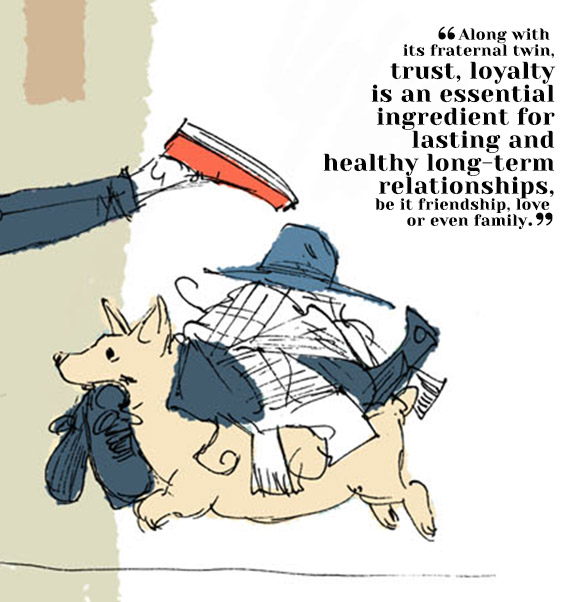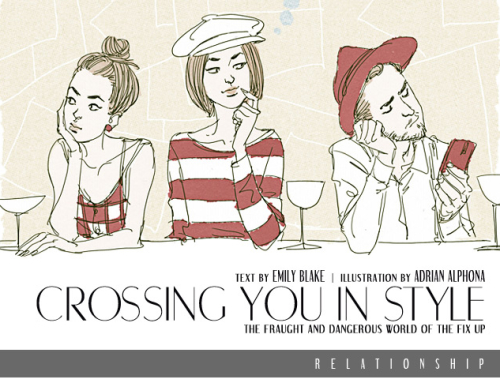Spring-cleaning has never made much sense to me. I suppose it lines up with the world around us feeling fresh and new, the mess of winter rinsing away, but to me, it has always felt like a procrastinator came up with the term. I say this as a procrastinator myself, who is capable of spotting the signs of my kin.
The fact is, when you come up with a grand plan for reinvention, and then go ahead and put a silly and unnecessary timeline on it, like, “oh yes, I will have a beautiful, organized home, but I can’t even think about starting on that for another month and a half because of the weather,” that is some grade-A avoidance, people. However, since it is spring, the season in which no one apparently has any excuse to avoid cleaning, it’s an opportune time to think about another form of deep cleanse: lifting the burden of loyalty from unhealthy relationships, with an expiry date that has long since passed.
In general, I believe deeply in loyalty. Along with its fraternal twin, trust, loyalty is an essential ingredient for lasting and healthy long-term relationships, be it friendship, love or even family. As such, once someone has proven disloyal, under whatever terms have been set out within that relationship, the relationship is inevitably doomed. When talking “terms,” it’s important to remember that these can vary wildly —there are no hard-and-fast rules. For example, while some romantic relationships are built on rules that allow zero physical contact with the opposite sex ever, others work equally well while allowing both partners to have intimate relationships with other people. Loyalty in this case doesn’t mean “don’t cheat,” it means “do what you say you will.”
In essence, loyalty means you are ride or die, including when that requires you to see their worst side. You’ll keep the other’s secrets, and back them up in arguments, and always, always tell off anyone you overhear calling them names or telling tales about them outside of school.
Seems simple enough, right? Loyalty is good and you should give it to the people you love, the end. Not quite. What happens when you’re loyal—keeping secrets for a loved one, watching their back—but the recipient’s behavior isn’t exactly reciprocal? Maybe they cheat, maybe they lie, or maybe worst of all, they kept who they were from you completely, tricking you into offering loyalty to someone who was misrepresenting themselves. Beyond identifying disloyalty, how can you tell when it’s not just a little mistake or misunderstanding, or gauge when disloyalty is clearly irrevocable? Where is that invisible relationship perimeter that reads: “Back up! Time to learn your lesson; this person is not going to live up to your standards.”
Well, as it seems is always the case with any relationship question, the answer is subjective. For some, one mistake kills the impulse to be loyal in return, while for others the issue is not so black and white. What if someone proves intensely loyal in one area, but doesn’t back you up in another? What if their disloyalty shows up in small ways that add up over time like a cluster of paper cuts?
My answer has more to do with spring-cleaning than you might have initially imagined reading my non sequitur of an opening paragraph. You just know someone is disloyal and not worth having in your life the vast majority of the time, just like you know when your house is a gross mess and should be cleaned.
Usually, any waffling on the issue means you just don’t want to acknowledge it. Most of us try to give ourselves an arbitrary grace period before taking on the emotional heavy lifting of cutting our ties with someone we once considered worthy of our loyalty. “One more chance” we think, or, “I’ll wait until that family event is over, so as not to have to upset/explain this to everyone there.” Perhaps most insidiously, sometimes the person we know we can’t trust any longer has done such a good job fostering our loyalty that we believe we are essential to them, that by leaving we will cause irreparable damage, or cause them to do so to themselves. So, as the “stronger” person of the two, we stay, self-immolating for the sake of someone who we have already decided is not worth the investment we had previously entrusted with them.
The problem with putting off removing these people from your life is that, the longer they are permitted to stay, the more they devalue what the quality of your relationship means to you, overall. It is extremely common for instance, for a partner in a romantic relationship, one who has always been known for being extremely loyal, to begin to behave otherwise once their trust is broken. What has led them to lose trust in their partner may not have been enough to inspire the packing of bags and a swift departure, but it might just allow them to begin to hold themselves to less stringent standards—be it talking poorly about the offending partner or even cheating—because they no longer feel the loyalty they were doling out is or was justified. This slip into “tit for tat” bad behavior hurts everyone, but ultimately is most damaging to the person doing it.
Before they began considering abandoning their post, the “loyalist” in question was likely able to picture themselves better than what they now are, still flawed of course, but less so… more moral even because of their loyalty and what that demanded of them. Losing that sense of self follows you, even after you’ve divided your assets and painted a new apartment. There are lots of reasons to call it quits, but one that should be given way more credit is: It is not worth staying in something, while letting it make you less than you were before.
So back to my earlier question, how do you know when loyalty is gone for good? In my experience, trust goes first. If you feel the friend or partner in question can no longer be trusted, not only with your secrets or feelings, but also to think of you when making their own decisions—ones that might directly affect you—it will be that much harder for you to factor them in when making yours. If this is the case, the next step is to figure out why you are still maintaining the relationship. Is it avoidance? Fear of their reaction? Fear that they can’t handle life without you in some way or another? Whatever the reason, the key is that while mistakes can be made and relationships can be repaired, once you’ve lost the impulse to be loyal, it isn’t coming back. And, procrastinating about doing something concrete to fix things, will only heighten the likelihood of behaving in ways you’ll regret down the road. Or, just as bad, you might be wasting time that could have been spent investing in relationships in which your loyalty would be returned.
My point is, cleaning is never bad, no matter the season. If you know something is dirty, tidy up, even if it means more explaining to do at your Aunt Dot’s 95th birthday jam. Something fun you may discover about trimming disloyal people from your life; once they’re gone, you get to hear what everyone else really thought about them. Spoiler alert: it’s about as positive as what they thought of your pigsty apartment before you cleaned it.
















